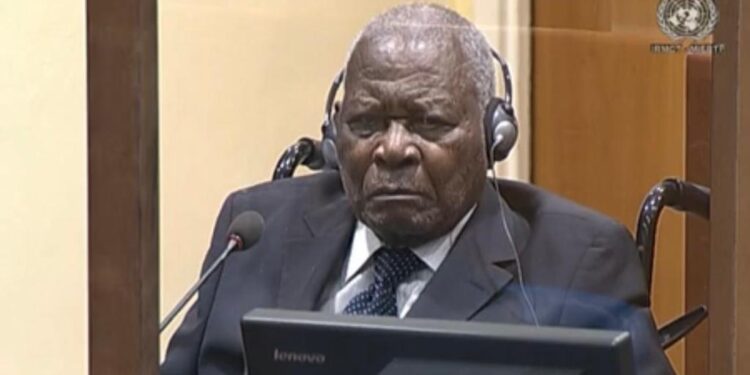UN appeal judges at the International Residual Mechanism for Criminal Tribunals (IRMCT) have rejected plans for an alternative trial procedure for the Rwanda genocide suspect, Félicien Kabuga.
In a ruling on August 7, 2023, judges Carmel Agius (Presiding), Burton Hall, Liu Daqun, Aminatta Lois Runeni N’gum, and José Ricardo de Prada Solaesa, noted that the lower court made an “error of law” in its June 6, 2023, decision to continue with the “trial of facts”.
On March 10, 2023, Kabuga’s trial was put on hold by the Hague-based tribunal as his health was evaluated to determine whether he was fit to continue his presence in court. The decision followed a joint Monitoring Report dated March 3, which contained findings from a panel of three independent medical experts evaluating Kabuga’s condition.
The experts unanimously agreed that “Mr Kabuga’s physical health and mental capacities had deteriorated significantly since their previous assessments, that he now meets the clinical criteria for dementia, and that he cannot meaningfully participate in his trial regardless of trial modalities or accommodations.”
However, the court requested the three medical experts who examined Kabuga’s health to provide their testimonies to the judges to assist the court in determining “the future course of the trial.”
Based on their findings, the Trial Chamber, in June, eventually ruled that Kabuga was not fit to stand trial and stated that it was highly unlikely that he would regain fitness in the future. The court then suggested an “alternative finding procedure” similar to a trial but without the possibility of conviction. This decision was contested by both the Prosecution and the Defence, leading to the appeals.
In the August 7 decision, the Appeals Chamber maintained that the Prosecution’s appeal lacked sufficient evidence to demonstrate any legal errors in the Trial Chamber’s determination that Mr Kabuga was unfit to participate in the trial. In this regard, it supported the earlier finding that Mr Kabuga’s physical and mental state rendered him incapable of meaningfully engaging in the legal proceedings.
The decision has since received mixed reactions among activists and legal experts. While others imply that the ruling is the end of Kabuga’s trial, some experts note that the Appeals Chamber decision was correct.
“The Kabuga Appeals Chamber decision seems correct – particularly concerning the Trial Chamber’s invention of an alternative procedure that has no basis in the tribunal’s statute,” said Kevin Jon Heller, a Professor of International Law and Security at the University of Copenhagen’s Centre for Military Studies, in a Twitter post.
Rightfully so, the Appeals Chamber granted the Defense’s appeal, stating that neither the Statute, the IRMCT, nor its predecessor tribunals allow the adoption of an “alternative finding procedure” in place of a trial. It noted that such a procedure bypassed the statutory guarantees provided to accused individuals and constituted a legal error.
ALSO READ: From fearless reporting to seeking asylum: Burundian journalist fights to reclaim his voice and safety
As a result of these findings, the Chamber remanded the matter back to the Trial Chamber with instructions to impose an indefinite stay of proceedings due to Mr Kabuga’s lack of fitness to stand trial and to swiftly address the issue of Mr Kabuga’s detention while the case remains on hold.
Kabuga’s trial has been a significant endeavour in the pursuit of justice for the victims and survivors of the Rwandan genocide, and its indefinite suspension, therefore, raises pertinent questions about the future of his case.
The trial began in September 2022 before the IRMCT, which handles cases left over from the now-closed International Criminal Tribunal for Rwanda (ICTR) and the International Criminal Tribunal for the former Yugoslavia (ICTY). He pleaded not guilty at his first tribunal appearance in November 2020.
Kabuga, who was arrested in May 2020 in Paris after 26 years on the run, is charged with genocide, complicity in genocide, direct and public incitement to commit genocide, attempt to commit genocide, conspiracy to commit genocide and crimes against humanity.
Prosecutors say Kabuga was one of the main financiers of the Rwanda genocide, in which an estimated 800,000 ethnic Tutsis and moderate Hutus were killed in 100 days. He is also accused of being the president of Radio Television Libre des Mille Collines (RTLM), a radio station that broadcast hateful propaganda and called for the extermination of the Tutsi minority.
While rendering its verdict, the Appeals Chamber acknowledged its awareness of the need to strike a balance between the international community’s fundamental interest in prosecuting individuals accused of grave international humanitarian law violations and the essential rights of the accused. It stressed that this equilibrium must be achieved within the confines of what the Mechanism is mandated to do, a sentiment praised by several legal experts on social media.
Iain Edwards, a seasoned barrister at 1CMB Chambers, and defence at International Criminal Court and UN IRMCT, praised the decision saying it is “principled and undoubtedly correct.”
“Also, it has to be said, courageous. It would have been easy for a lesser Bench to dodge the difficult conclusion; justice can be delivered only by holding trials that are fair and conducted with full respect for the rights of the accused,” Edwards added.
The Chamber also acknowledged the prolonged wait of victims and survivors of the crimes attributed to Mr Kabuga for justice to be served, noting that the inability to conclude trial proceedings due to Mr Kabuga’s incapacitation is a source of disappointment. However, the court held that justice can only be realized through trials that are equitable and conducted with full reverence for the accused’s rights as outlined in the Statute.
The decision marks a significant juncture in the case of Félicien Kabuga, shedding light on the intricate balance between the pursuit of justice and the protection of the rights of the accused within the international legal landscape.







